Evidence
Guilt is written all over your face.
Lipstick on your collar. The smell of perfume I never use. Hotel matches in your pocket. A strange door key too.
It’s not how the song started—she began by recalling ‘I always had so much faith in you’—but it’s how it’s going. And with the listing, the piling up of the telltale signs, comes the reason we’re all gathered here to listen.
I’ve got evidence.
Guilt is written all over your face.
The singer’s faith is shattered. Not her faith in the Lord, perhaps, nor her faith in justice, but her faith in men: false lovers, guilty liars, careless sinners leaving all manner of clues behind as they go about their cheating ways. She’s got enough evidence to put him away for good this time. The court is sitting, and sentence is being passed.
The clues keep turning up. You can’t tell me you’ve been out with the boys. The verdict is guilty all the way. I got the proof I need.
I’ve got enough evidence to put you away.
Candi Staton’s ‘Evidence’ was released as the flipside to ‘Sweet Feelings’, her fourth single for Rick Hall’s Fame label, in April 1970. The previous year had seen the release of three singles recorded at the legendary FAME studios in Muscle Shoals, Alabama, a wellspring of southern soul greatness. Songs like ‘I'd Rather Be an Old Man's Sweetheart (Than A Young Man's Fool)’, ‘I'm Just a Prisoner (Of Your Good Lovin')’ and ‘Heart on a String’ had already established Staton as a force to be reckoned with. Seven of the singles she’d make with Hall would enter the US R&B Top 20 between 1969 and 1973, years before the disco-era smash ‘Young Hearts Run Free’ became her signature song.
More explicitly than other Candi classics, ‘Evidence’ lines up an array of objects that testify to a lover’s infidelity. As so often in songs like this (though there aren’t many just like this), objects become the witnesses of human lives, unmuting themselves to give the game away, to tell it like it is. The lipstick, the perfume and the hotel matches take up their roles in ‘Evidence’ just like the lipstick on the cigarette in the ashtray and the half-filled cup of coffee in George Jones’ ‘Good Year for the Roses’ or the ashtray that ‘says you were up all night’ in Wilco’s ‘Shot in the Arm’.
Artists like Candi Staton amplify the evidence that objects provide, foregrounding them to create new objects that stick in the ear and in the mind. It’s a beautiful metamorphosis. A smudge of lipstick becomes a lyrical object becomes a song object becomes something fixed to humans and machines. The evidence piles up and it’s all still available. We get to evaluate it over and over, or to discover it anew. The case can always be opened again; we just need to find where the evidence is stored.
There are many things happening in ‘Evidence’ to make sure the message gets through, that testimony is heard. Driving it all is Candi’s voice: coarse, weathered, tested to the limit by Rick Hall’s endless demands for retakes, even when the first take was often the best; commanding, accusing, weighing up the evidence of every line, seeing where it might lead, exploring all the possibilities; delivering the truth as only a justified accuser can do. Candi’s listeners know she can be as tender and caressing as any soul balladeer, as sad, accepting or reflective as any country crooner. Check out ‘You Don’t Love Me No More’, ‘Stand by Your Man’, ‘He Called Me Baby’, ‘Do Right Woman’, ‘In the Ghetto’, ‘It’s Not Love’. But that’s not what’s needed here. ‘Evidence’ requires a particular kind of conviction and authority, something that comes from righteous indignation and moves into justified sentencing.
Then there’s that percussion: tentative at first, increasingly assertive, gathering the assurance that the singer is bringing, and setting up the swirling keyboards and stabbing brass, driving it all on to a foregone conclusion.
The verdict is guilty all of the way.
Links in the chain
Let’s not forget the backing vocals. How could we?
I remember when, listening to Aretha Franklin’s ‘Chain of Fools’, I was reminded of how the word ‘chain’ becomes a repeated object in the recording, just like the links of a chain that’s holding everything together. What really helps make the connection are Aretha’s backing singers: chain, chain, chain (chain chain chain).
Vocals like these are vital connective tissue, chain links, structures all of their own. Often these links are low key enough to be doing their work subtly, staking their place from a distance, ‘twenty feet from stardom’. But there are also examples where the links overdetermine the chain: the Sweet Inspirations don’t quite do this on ‘Chain of Fools’, though the Pips arguably do on Gladys Knight’s timeless ‘Midnight Train to Georgia’.
With ‘Evidence’, the backing vocals do their duty and more. While Candi gets herself worked up as prosecutor, her singers provide witness, judge and jury: condemning the cheating object of the song to ‘working on the chain gang’ (more chains!).
If that ain’t evidence.
I got the evidence.
Back on the chain gang.
Working on the chain gang.
You got another woman!
Got enough evidence to put you away.
Talking about objects, how about those discs that ‘Evidence’ was stored on? The 7-inch singles—mostly emphasising ‘Sweet Feeling’ as the lead, with ‘Evidence’ on the flipside—provide further clues to the song’s journey around the world, finding new jurors via US, Canadian, British, French, Dutch and Japanese pressings. They’re rare these days, but still circulate on the collectors market.
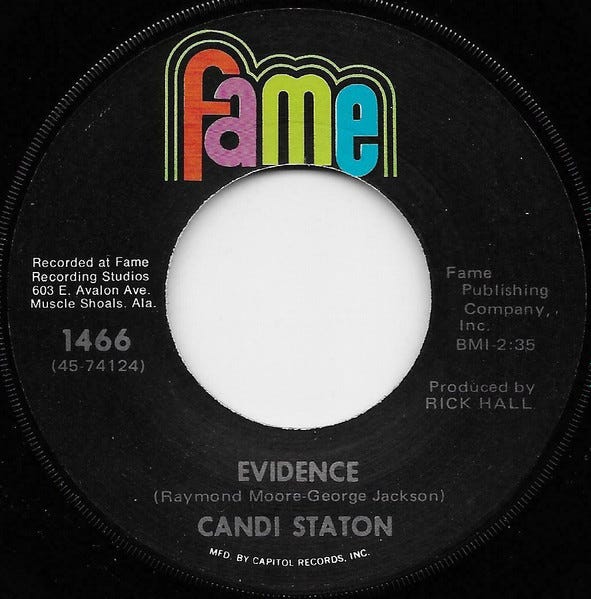
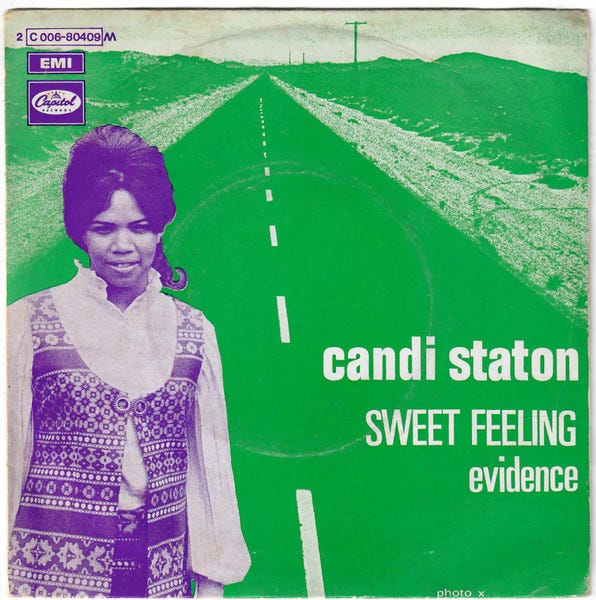
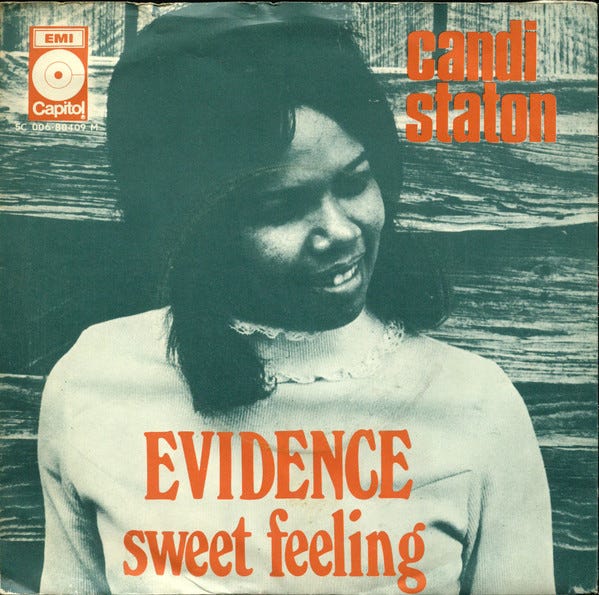
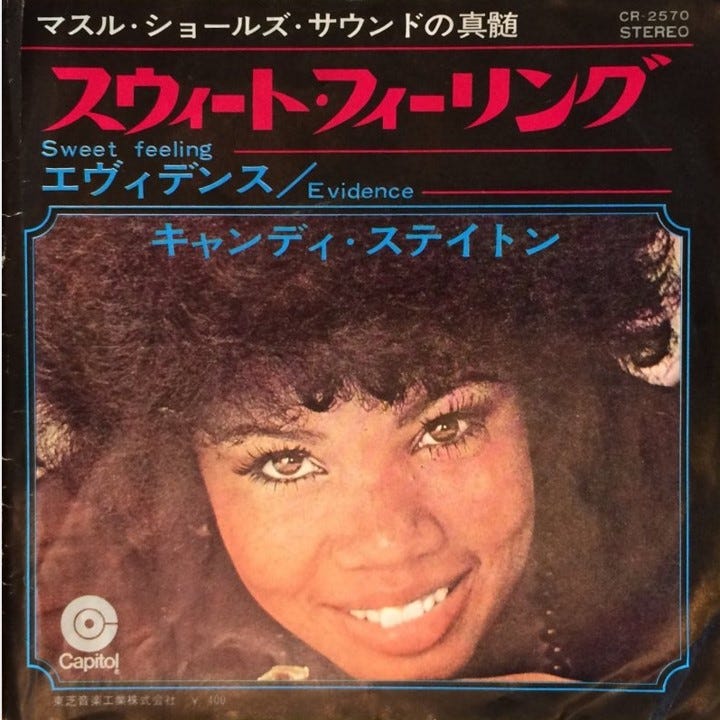
Then there’s the easier-to-find album on which the song appears; I’m Just a Prisoner was reissued by Ace Records in 2023, with a new Candi Staton interview included in the package.
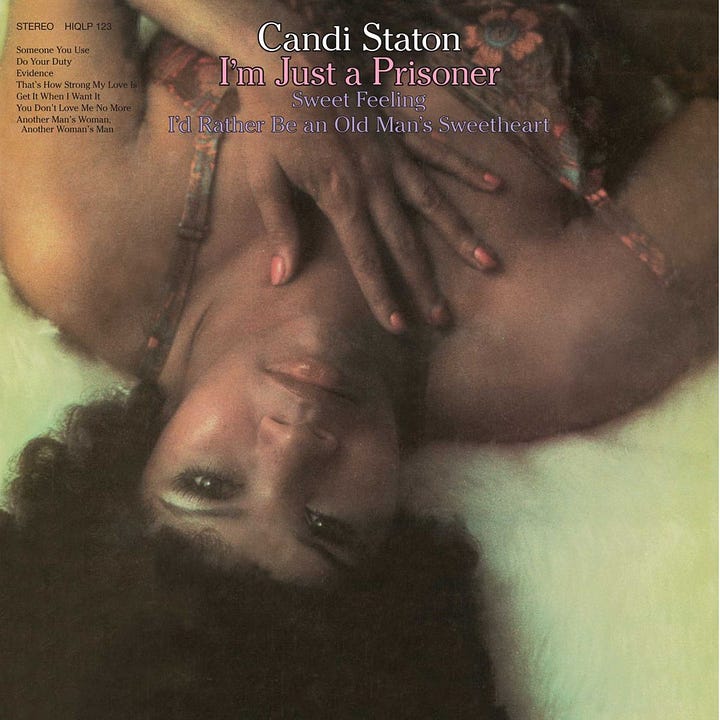
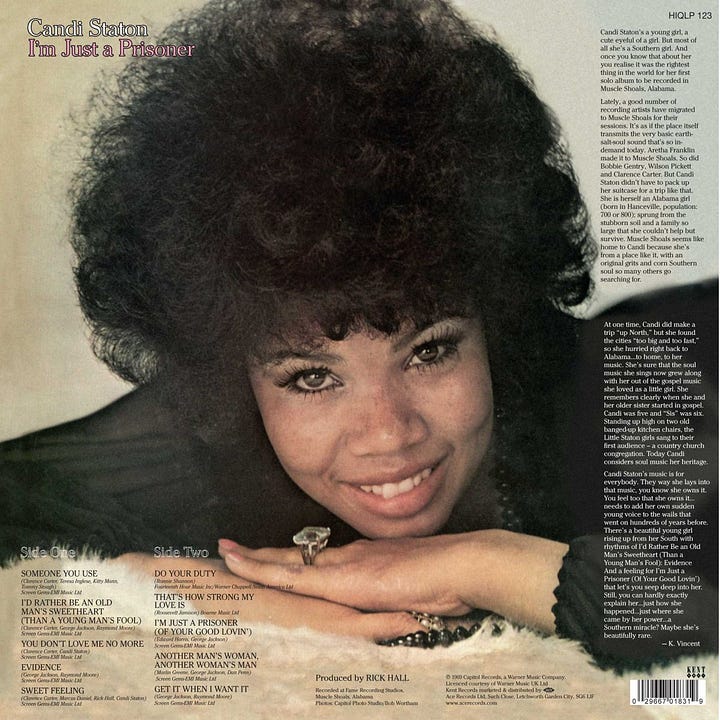
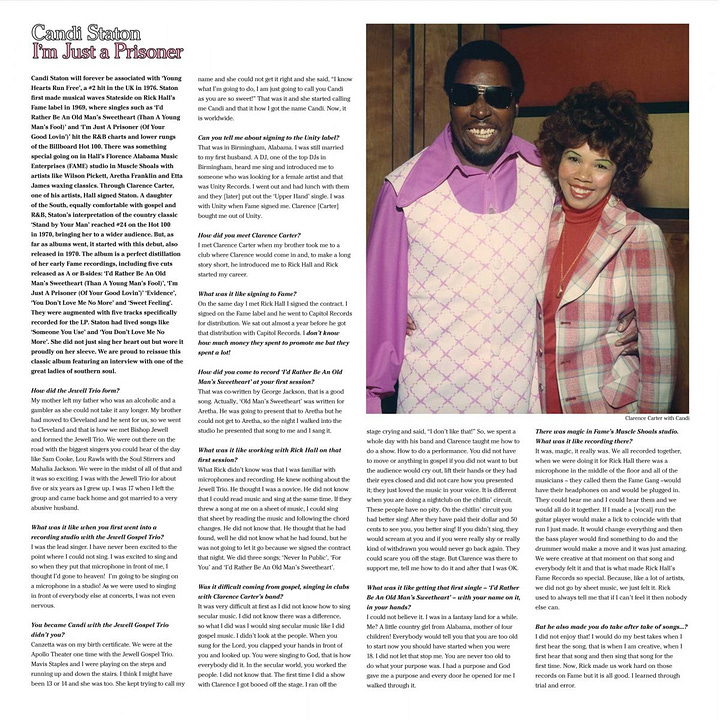
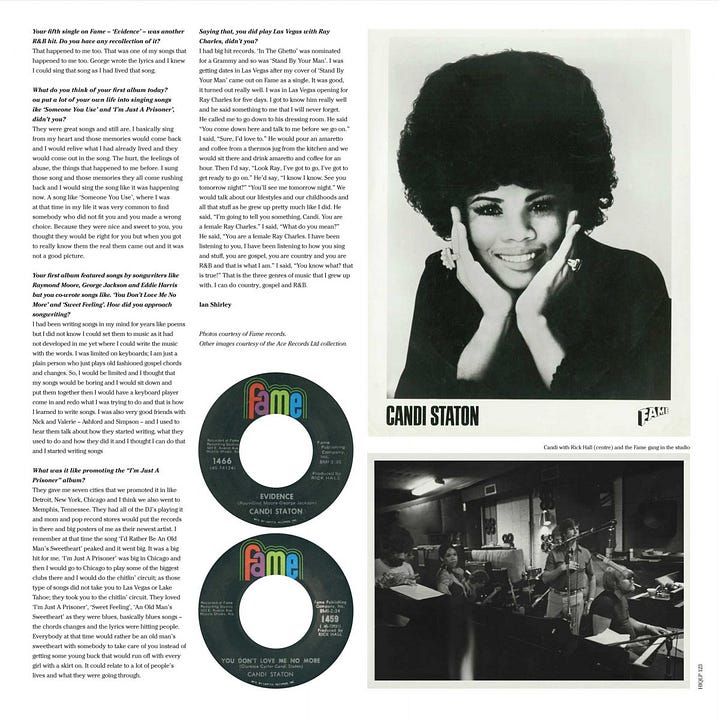
It’s all vital proof of the magic that went down at 603 East Avalon Avenue and what led out from that hallowed address.
Further evidence (if it were needed)
When Evidence becomes the title of a collection of Candi Staton recordings compiled by Ace in 2011, the word does additional duty. The 48 songs gathered on two CDs are proof of Staton’s brilliant tenure at FAME between 1969 and 1973; of the typical themes of fidelity and infidelity to be found in southern soul, country and R&B; of a time, a place, a sound and a revolving cast of characters all centred on a singular vision.
The songs—the recordings—are the evidence and, just as in any case that has started to go cold, the pieces may require some labour to put together. This is where the archival research of Dean Rudland, Tony Rounce and others comes in, made possible by the cooperation of Rick Hall, the tape vaults at the Alabama studio and the recollections of the musicians involved. Further visual evidence is provided in the liner notes by the reproduction of record sleeves, labels and advertisements from trade magazines.
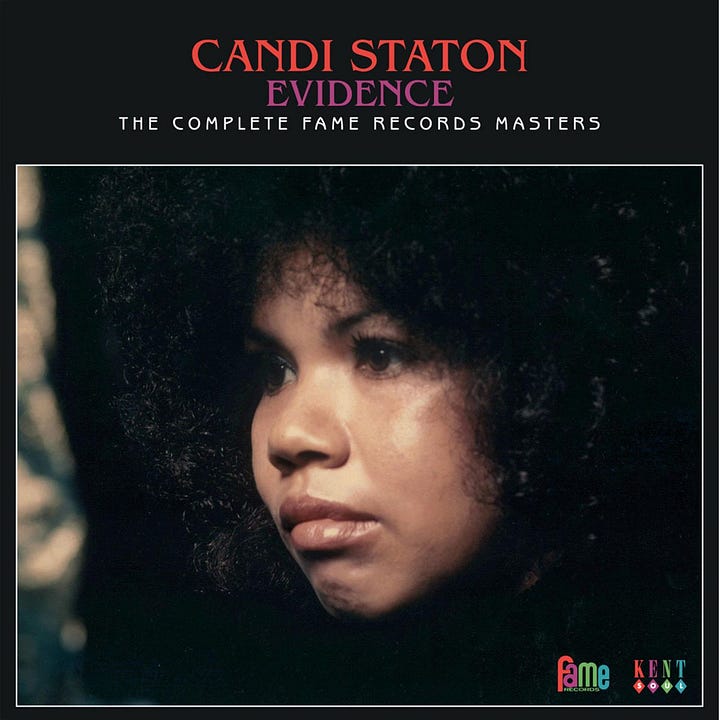
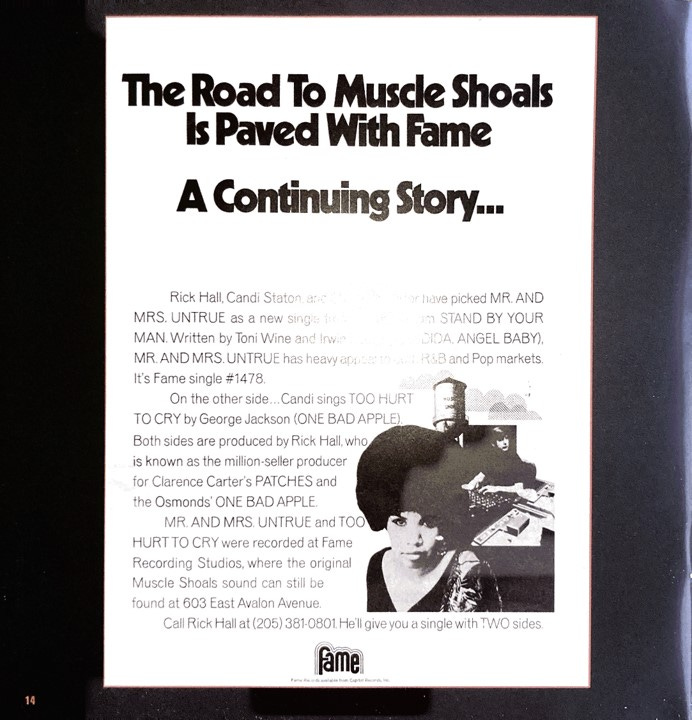
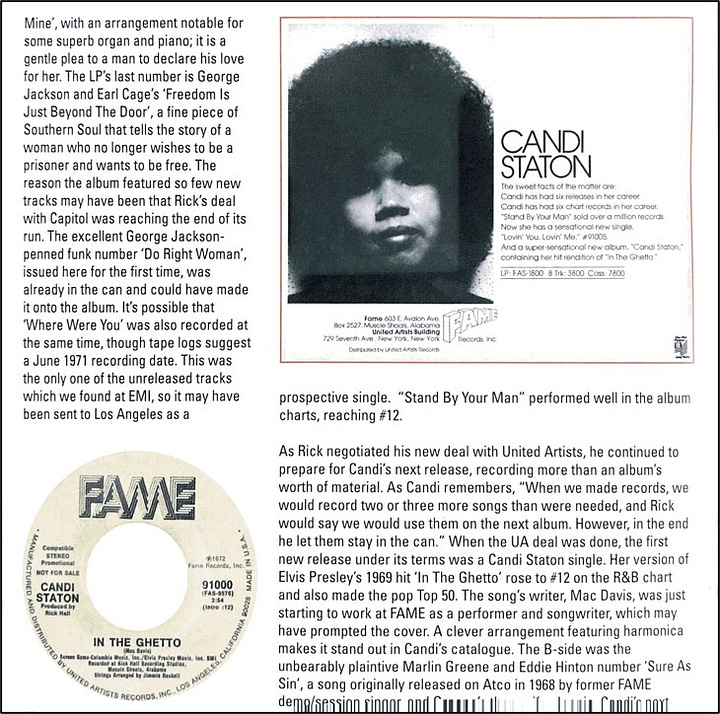
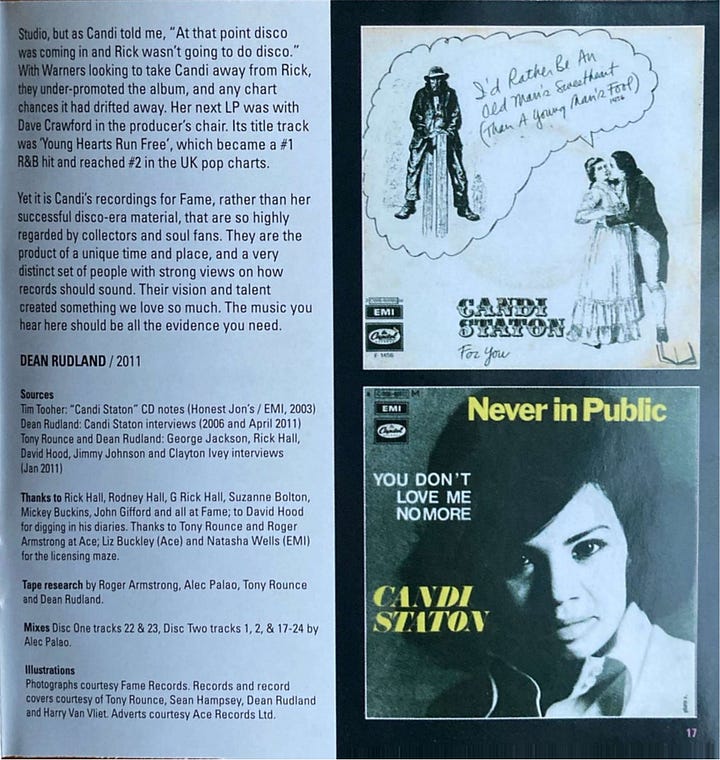
There are some for whom the 2011 compilation of Fame masters is evidence for claiming Candi Staton as the greatest southern soul singer of her era. I don’t have any problems with that assessment, even if it’s not the kind of thing I generally go around saying. I’m wowed by Candi Staton and I know I wouldn’t continue listening to Evidence—which has been a staple in my car stereo for over a decade, one of the few albums that hasn’t been substituted—if it weren’t for the way she delivers these tracks. But I’m just as intrigued by the consistency of the persona that comes through the lyrics and the scenarios being played out in the songs.
Most of them are not as obviously object-oriented as the title track. They are generally complaints, declarations, expressions of suspicion, confessions, commands. ‘I’m just someone you use’, ‘You don’t love me no more’, ‘Do what you’re supposed to do, do your duty’, ‘That’s how strong my love is’. There’s a lot of cheating going on. Usually, it’s the other party, but sometimes it’s the singer who’s in the wrong, and who knows it.
I keep my shades on Johnny Hotel is kind of crowded tonight Oh I'd hate to meet someone we know And force a smile when we don't want to be polite Take the elevator up And in a little while I will follow you But first go inside and sign us in as Mr. and Mrs. Untrue
‘Evidence’ (the song) was written by George Jackson and Raymond Moore, two in-house songwriters at FAME. Evidence (the compilation) testifies to these and other regular FAME writers’ consistency in crafting southern soul classics. Jackson and Moore were also the team behind ‘Get It When I Want It’, ‘How Can I Put Out the Flame (When You Keep the Fire Burning)’ and, in collaboration with Larry Chambers, ‘Love Chain’. With Clarence Carter—the artist who brought Candi Staton to FAME and would later be one of her husbands—the pair also authored ‘I’d Rather Be an Old Man’s Sweetheart’, a song originally intended for Aretha Franklin but which became Candi’s debut for Fame.
Jackson would produce what Staton calls ‘the hurting type songs’. Asked about ‘Evidence’ in the interview for the recent I’m Just a Prisoner reissue, she says, ‘George wrote the lyrics and I knew I could sing that song as I had lived that song’. Of her repertoire of love-gone-wrong tracks more generally, she says:
‘I basically sing from my heart and those memories would come back and I would relive what I had already lived and they would come out in the song. The hurt, the feelings of abuse, the things that happened to me before.’
I’m mostly not gathering stories from Candi’s biography to serve as evidence here. I don’t feel they’re necessary. There are some I really like, though, such as her changing her name from Canzetta to Candi because a young Mavis Staples had trouble pronouncing her given name (Mavis and Candi were on the touring circuit together as teens).
But even if I’m not trying to explain Candi’s powerful performances though her backstory, there can be little doubt that she brought a whole gamut of experience to the songs she sang. While we might take issue with the way she was represented in the liner notes for her debut LP—what did if feel like to be summed up as ‘a cute eyeful of a girl’?—one thing that semi-anonymous writer (‘K. Vincent’) got absolutely correct was when they said, ‘The way she lays into that music, you know she owns it’.
Candi convinces through her performances and through the brilliant arrangements they were given. To be completely convinced, though, the audience has to have felt and lived some of those same experiences. The songs need to articulate their lives and trigger the ‘amen’ response. Though, by her own account, she struggled to move from church performance to the secular stage (like Aretha she came from gospel and would occasionally go back to that world), her songs found their audience. ‘These type of songs’, she told Ian Shirley, ‘did not take you to Las Vegas or Lake Tahoe; they took you to the chitlin’ circuit’.
‘They loved “I’m just a Prisoner”, “Sweet Feeling”, “An Old Man’s Sweetheart” as they were blues, basically blues songs—the chord changes and the lyrics were hitting people. Everybody at that time would rather be an old man’s sweetheart with somebody to take care of you instead of getting some young buck that would run off with every girl with a skirt on. It could relate to a lot of people’s lives and what they were going through.’
‘I’m Just a Prisoner’ is a good track to bookend this appreciation of Candi Staton’s art. I won’t use as many words on it as I did for ‘Evidence’, but I’ll note the flipping of the corporal punishment narrative—here the singer is the one in chains, and those backing singers won’t let her forget it with their linked responses—and the cowrite by George Jackson, here working with Edward Harris.
‘Like all men of Babylon, I have been proconsul; like all, I have been a slave’ (Borges, ‘The Lottery in Babylon’). You might think that all this gathering and sifting of evidence requires the elimination of chance, something more systematic. That may be needed some of the time, but Candi Staton’s songs know that life doesn’t really work that way. It’s a bet we make based partly on probability but largely on an awareness of fate’s twisted paths. We occupy many contrasting positions in our lives, and we need songs for all of them.


Brilliant overview of a phenomenal soul singer, Richard. Your respect, love, and appreciation for her shine through. I thoroughly enjoyed taking my time reading this essay with my morning coffee. I didn't know about that Ace comp, but I am not surprised to see Dean Rudland was involved.
I'm sure you know these Millie Jackson albums, but they are worth mentioning as I find similarities between Candi and Millie's heartachingly beautiful 'It Hurts So Good' & 'Caught Up' LPs. If you haven't heard either, they come with my highest recommendation.
That is powerful; thank you for sharing. The thing that strikes me about "Evidence" is how alone she sounds (even with the back-up singers). She is angry but mostly she's exhausted and not ready to deal with what comes next.
I was amused to see you mention "Good Year For The Roses" because I had thought of it as soon as you mentioned the lipstick.
There's a song which I think of as the man's (inadequate) response in this situation -- "Don't Change Horses (In The Middle Of The Stream)" in which he says that yes, things might seem tough right now, but isn't that exactly the wrong time to be making a big decision. I like the song, and I think it exposes the self-centeredness of the man who is genuinely scared that she'll leave, and wants her to stay, but can't really offer to help carry the weight. He's just hoping that she'll decide to keep carrying it: https://www.youtube.com/watch?v=4WAIFl_ezic
"Hey, I know that enough is enough
But you shouldn't be talking 'bout givin' it up
Turn it loose, it might be right it seems
The wrong decision will spoil all our dreams
If you don't want to spoil our secret dreams
Don't change horses in the middle of a stream"